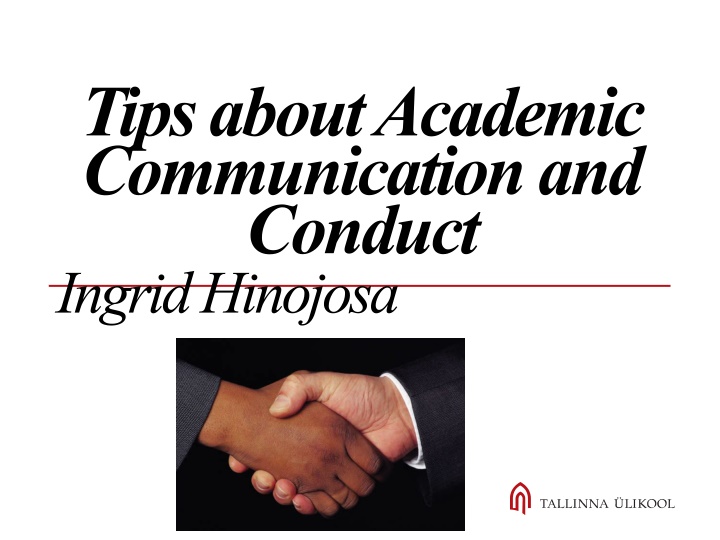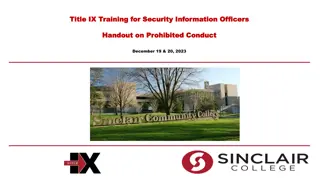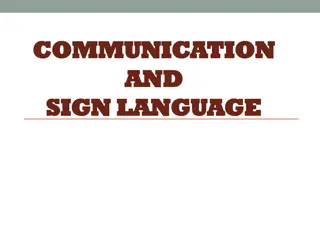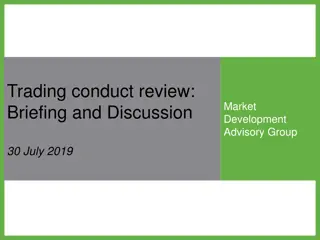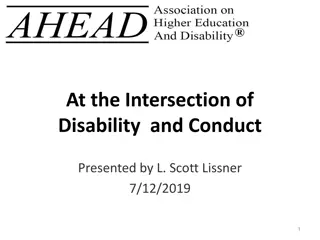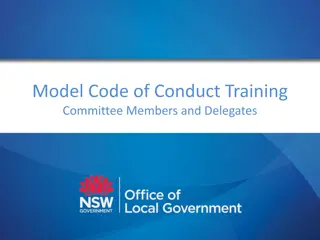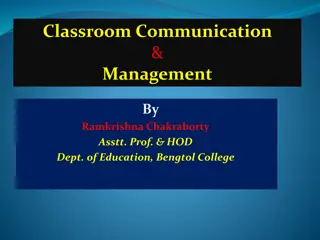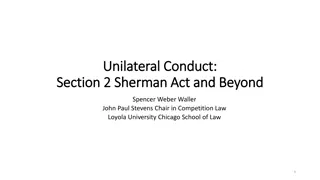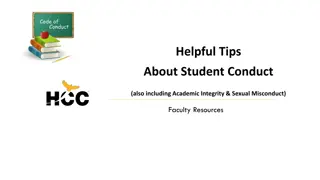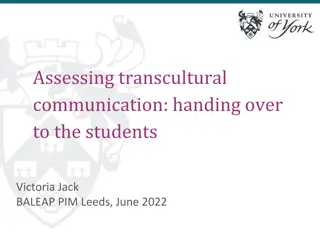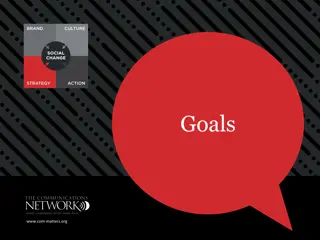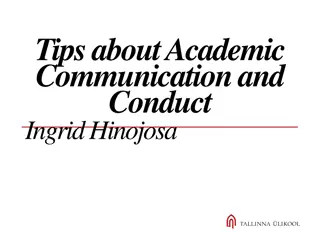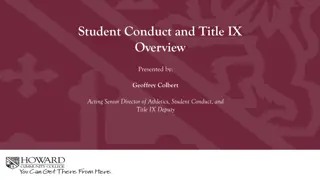Essential Tips for Academic Communication and Conduct
Understand the consequences of cheating and plagiarism in academic settings, follow proper email etiquette, respect office protocols, dress appropriately, and be aware of the stages and symptoms of culture shock when studying abroad. Maintain good academic practices to avoid penalties, respond to emails thoughtfully, and navigate office visits effectively. Remember to handle culture shock symptoms with care to ensure a successful academic journey.
Download Presentation

Please find below an Image/Link to download the presentation.
The content on the website is provided AS IS for your information and personal use only. It may not be sold, licensed, or shared on other websites without obtaining consent from the author.If you encounter any issues during the download, it is possible that the publisher has removed the file from their server.
You are allowed to download the files provided on this website for personal or commercial use, subject to the condition that they are used lawfully. All files are the property of their respective owners.
The content on the website is provided AS IS for your information and personal use only. It may not be sold, licensed, or shared on other websites without obtaining consent from the author.
E N D
Presentation Transcript
Tips about Academic Communication and Conduct Ingrid Hinojosa
Cheating and plagiarism (Study Regulations) In a case of disregard for academic practice, depending on the seriousness of the violation, the Director of the academic unit has the right to issue a letter of reprimand to the student or make a proposal to delete the student from the matriculation register. The following is considered a violation of academic practice: 1) Using additional materials; 2) Unauthorized exchange of knowledge during an examination 3) Participating in an examination or pass-fail assessment on behalf of another student or enabling it; 4) Submission of someone else s written work under one s own name or submitting previously submitted work; 5) Plagiarism, i.e. using somebody else s written work or ideas (also your own previous work) without providing proper academic reference; 6) Knowingly giving untrue data in papers and applications.
What will happen? If the student is detected as having violated good academic practice, a note will be added to the Transcript of Records and the course is marked as F. Read more about plagiarism at https://www.tlu.ee/en/students-about-ethics-and- plagiarism Good Practice in Learning: https://www.tlu.ee/en/application-good-academic- practice-studies
Emails Be polite Include as much relevant information as possible (field of studies) Save the email conversation Don t forget your name Read and reply to emails University staff does not have to respond instantly to your emails. Response time is three (at busy times five) working days. So, please be patient it does not make it faster if you send an email every hour.
Going to the office Respect the office hours If necessary, make an appointment Prefill your documents Introduce yourself Keep the volume down... One student at a time Please see the webpage first, usually all the information you need is there.
What to wear? Quite casual Appropriate attire for the occasion Appropriate to weather conditions
Symptoms of culture shock Boredom, loneliness Allergies, pain Obsession with own health Sleeplessness, excessive need of sleep Mood changes, depression, powerlessness Anger, animosity against other people Identification and idealisation of home culture Trying to absorb everything within the new culture too fast Not capable of solving even the most simple problems Loss of self confidence and insecurity Development of stereotypes in the new culture Strong longing for family and friends back home Feeling overlooked
Ideas for coping Accept that you cannot know everything Keep an open mind Try to do things that you did at home Stay in touch with family and friends at home it is OK to miss them Get to know someone from the new culture Talk to a friend or somebody else Stay active physical activity often helps Learn from experience but be patient, learning new things takes time Remember the good things as well Knowing about culture shock helps
General things to keep in mind Being late is considered rude We don t normally eat at lectures People are treated equal no matter what their gender or age is Respect agreements. Let the other person know if there has been a change of plans Students are expected to be independent. University staff normally communicates directly with students, not with their parents or friends
Cultural tips Remove your shoes when visiting someones s home Don t take it personally when people seem too serious to you this is just the nature of people here Estonians can get very sensitive when someone makes a critical remark about their culture Greetings are rather formal (handshake)
Legal considerations Drinking and smoking are illegal if you are under 18 All drugs are illegal! Drinking and smoking are not allowed in public places Wearing a reflector in the dark is required by law HELKUR
Case study An exchange student from Southern Europe came to Estonia and he was very happy with his choice everything was very well- organized and he felt welcomed. After some time he started to realize that people aren t very friendly they didn t greet him in the corridor and turned the head away. Once he was invited to an Estonian wedding. He learned Estonian songs and dances and got to know many Estonian students. Next week his new friends acted as nothing had happened, they only said Hi! in the corridor and walked on. The exchange student felt guilty and was wondering what he was doing wrong. Why did this situation occur?
Case study An exchange student from went shopping in Estonia and was very surprised. She wanted to buy boots and it took time before she got the attention from the shop assistants. The assistants helped her but were quiet and reserved, didn t smile nor asked her if she needed extra assistance. It seemed to the student that the assistants were impolite and blamed herself for not acting correctly. The exchange student went to the adviser and asked what she had done wrong. What could she do differently next time when she goes shopping. Why did this situation occur?
Hofstede's model for comparing countries https://www.hofstede-insights.com/country- comparison-tool
Have a safe and enjoyable stay here! Visitestonia.com
